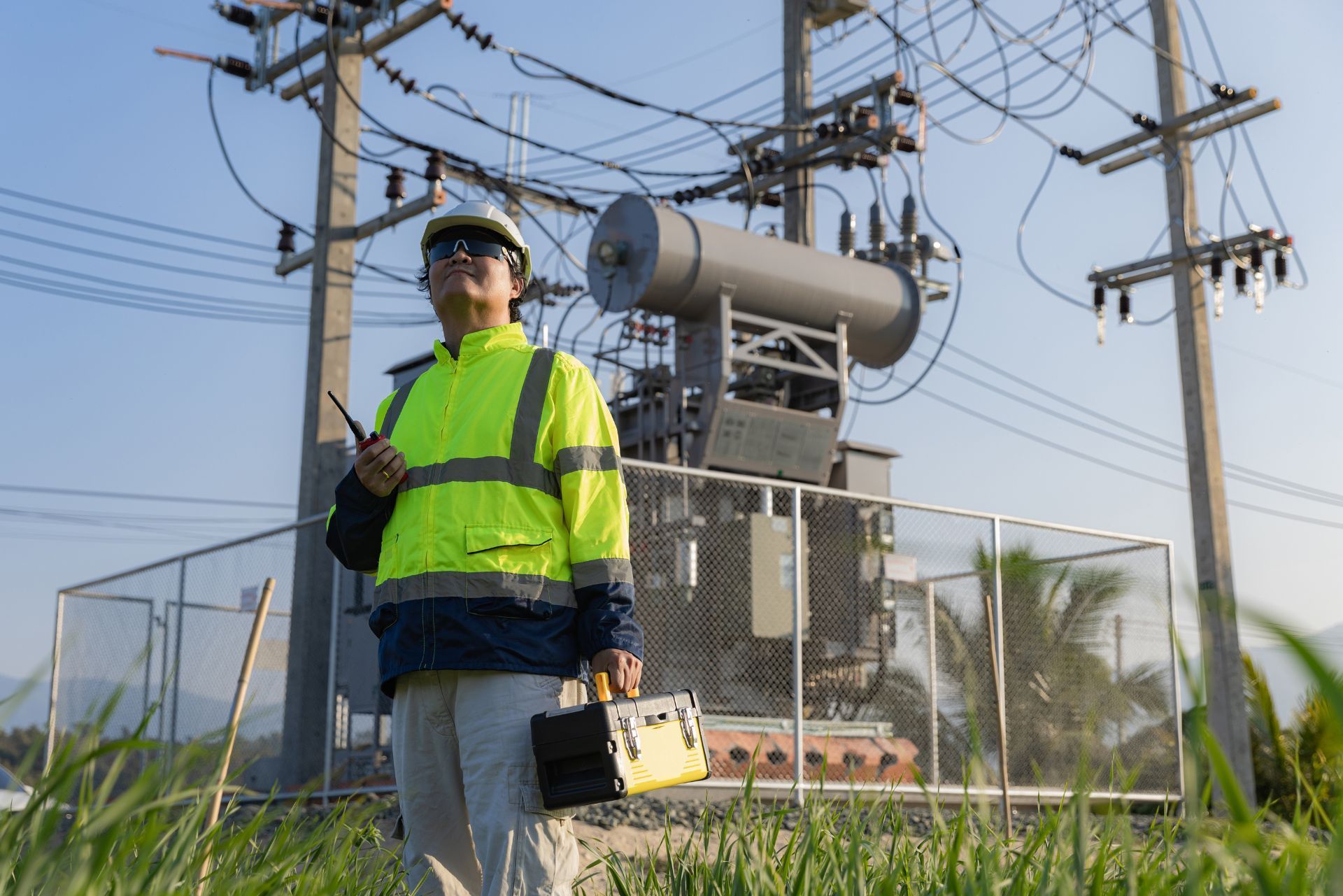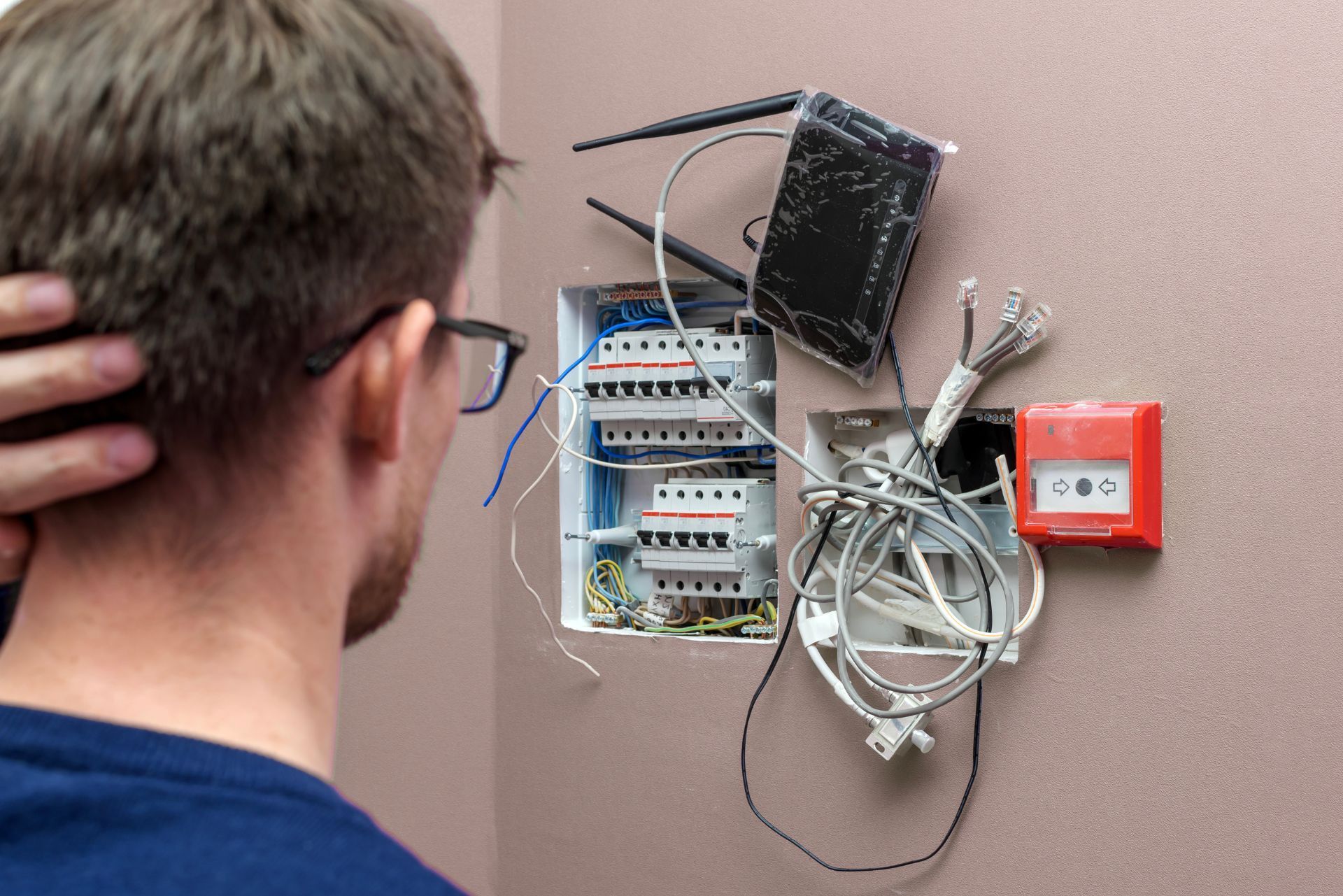Fire Alarm System Electrician Insurance
See How We're Different
or call us: 888-988-2347
Index
Why Insurance is Crucial for Fire Alarm System Electricians
Types of Insurance Coverage for Fire Alarm System Electricians
Factors Affecting Fire Alarm System Electrician Insurance Premiums
How to Choose the Right Insurance Policy
Common Challenges and How to Overcome Them
Real-World Examples Illustrating the Importance of Insurance
Contact Us
Phone
Location
Simi Valley, CA 93065
The Woodlands, TX 77382
Katy, TX 77494
Fire alarm system electricians play a critical role in safeguarding lives and property by installing, maintaining, and repairing fire detection and alarm systems. Given the high stakes involved in their work, having the right insurance coverage is essential—not only to protect their business but also to ensure compliance with legal and industry standards. This comprehensive guide explores everything you need to know about fire alarm system electrician insurance, from the types of coverage available to the factors influencing premiums and how to choose the best policy for your needs.
Why Insurance is Crucial for Fire Alarm System Electricians
Fire alarm system electricians operate in a niche that demands precision and reliability. Their work directly impacts building safety and emergency response effectiveness. Consequently, the risks they face and the potential liabilities they carry are significant.
Insurance is not just a safety net; it’s a business necessity. Without adequate coverage, electricians risk financial devastation from lawsuits, property damage claims, or injury-related expenses. Moreover, many clients and regulatory bodies require proof of insurance before awarding contracts or permits.
High-Risk Nature of the Work
Working with electrical systems and fire alarm components involves inherent dangers. Mistakes can lead to system failures, false alarms, or worse, undetected fires. Such outcomes can result in property damage, personal injury, or even loss of life, exposing electricians to expensive legal claims. The stakes are particularly high in commercial settings, where a malfunctioning fire alarm could jeopardize the safety of hundreds of occupants. This reality underscores the importance of rigorous training and adherence to safety protocols, as even a minor oversight can have catastrophic consequences.
Legal and Contractual Requirements
In many jurisdictions, electricians must carry certain types of insurance to obtain licenses or permits. Additionally, commercial clients often mandate contractors to have insurance as a condition of hiring. This ensures that any damages or injuries incurred during the project are covered. Furthermore, the specifics of these insurance requirements can vary widely depending on local laws and the nature of the work being performed. For instance, some contracts may stipulate higher coverage limits for larger projects, reflecting the increased risk involved. Understanding these legal nuances is essential for electricians to remain compliant and competitive in the industry.
Beyond the basic requirements, having comprehensive insurance can also enhance an electrician's reputation. Clients are more likely to trust professionals who can demonstrate their commitment to safety and responsibility through proper coverage. This trust can lead to more job opportunities and long-term relationships with clients, as businesses prefer to partner with insured contractors who can mitigate potential risks. Additionally, insurance can provide peace of mind, allowing electricians to focus on their work without the constant worry of potential liabilities hanging over their heads.

Types of Insurance Coverage for Fire Alarm System Electricians
Understanding the different types of insurance available is key to building a comprehensive protection plan. Below are the most common and essential coverages for fire alarm system electricians.
General Liability Insurance
General liability insurance is the cornerstone of any contractor’s insurance portfolio. It covers third-party claims for bodily injury, property damage, and personal injury that occur as a result of business operations. For fire alarm electricians, this might include a client tripping over tools or accidental damage to a client’s property during installation.
Typical coverage limits range from $1 million to $2 million per occurrence, but higher limits may be advisable depending on the size and scope of projects. Additionally, it’s important for electricians to review their policy regularly to ensure it aligns with their evolving business needs, especially as they take on larger projects or expand their services.
Professional Liability Insurance (Errors & Omissions)
Also known as errors and omissions (E&O) insurance, this coverage protects against claims arising from professional mistakes, negligence, or failure to perform duties as promised. For example, if a fire alarm system is improperly installed and fails during an emergency, leading to damages or injuries, professional liability insurance can cover legal defense costs and settlements.
This type of insurance is particularly important for electricians who design or certify fire alarm systems, as it addresses risks beyond physical accidents. It can also cover claims related to inadequate advice or failure to meet industry standards, which can be crucial in a field where compliance with safety regulations is paramount.
Workers’ Compensation Insurance
Given the physical nature of electrical work, injuries on the job are a real possibility. Workers’ compensation insurance covers medical expenses and lost wages for employees injured while working. It also protects employers from lawsuits related to workplace injuries.
Most states require businesses with employees to carry workers’ compensation insurance, making it a non-negotiable part of an electrician’s insurance portfolio. Moreover, investing in safety training and equipment can help reduce the number of workplace injuries, thereby potentially lowering insurance premiums over time.
Commercial Auto Insurance
Many fire alarm electricians use vehicles to transport tools and equipment to job sites. Commercial auto insurance covers vehicles used for business purposes, protecting against accidents, theft, and damage.
Personal auto insurance policies typically exclude coverage for vehicles used in business, so commercial auto insurance is essential for electricians who rely on transportation. Additionally, maintaining a clean driving record can help keep premiums lower, and some insurers offer discounts for safe driving practices or for using vehicles equipped with safety features.
Tools and Equipment Insurance
Fire alarm system electricians depend on specialized tools and equipment that can be costly to replace. Tools and equipment insurance covers loss, theft, or damage to these items, whether on-site, in transit, or in storage.
This coverage helps maintain business continuity by ensuring that electricians can quickly replace essential gear without significant financial strain. Furthermore, keeping an updated inventory of tools and equipment can streamline the claims process, making it easier to report losses and receive timely compensation.
Factors Affecting Fire Alarm System Electrician Insurance Premiums
Insurance premiums for fire alarm system electricians vary widely based on several factors. Understanding these can help electricians manage costs and tailor coverage to their specific needs.
Business Size and Revenue
Larger businesses with higher revenues generally pay more for insurance because they typically have more employees, equipment, and exposure to risk. A sole proprietor working on small residential projects will usually face lower premiums than a company handling large commercial installations. Additionally, larger firms often have more complex operational structures, which can introduce unique risks that insurers must consider. As a result, these businesses may need to invest in specialized insurance products that cater to their larger scale operations, further influencing their overall insurance costs.
Experience and Claims History
Insurers assess the risk profile of electricians based on their experience and past claims. A clean claims history and extensive experience can lead to lower premiums, while frequent claims or a lack of experience may increase costs. Moreover, seasoned electricians often have established safety protocols and training programs that mitigate risks, making them more attractive to insurers. Newer electricians, on the other hand, might not yet have the same level of risk management strategies in place, which can lead to higher premiums as they build their reputation and experience in the industry.
Scope of Work and Project Types
The nature of projects undertaken affects risk. Working on complex commercial or industrial fire alarm systems may carry higher risks than residential installations, influencing premium rates accordingly. Electricians who specialize in high-risk environments, such as manufacturing facilities or hospitals, may need to secure additional coverage that addresses specific hazards associated with those settings. This specialization can lead to a more tailored insurance policy, but it may also come with increased costs due to the heightened risk profile.
Coverage Limits and Deductibles
Higher coverage limits increase premiums, while higher deductibles can reduce them. Electricians must balance adequate protection with affordability when selecting policy limits and deductibles. It's essential for electricians to carefully evaluate their potential liabilities and the value of their assets when deciding on coverage levels. In some cases, opting for a higher deductible can be a strategic move, allowing electricians to lower their premiums while still maintaining a safety net that protects against significant financial loss in the event of a claim.
Location and Regulatory Environment
Insurance costs vary by region due to differences in legal requirements, labor costs, and local risk factors such as weather or crime rates. Electricians operating in urban areas with higher litigation rates may face higher premiums. Additionally, regions with stringent building codes and regulations may require electricians to carry specialized insurance that aligns with local standards, further impacting costs. Understanding the local regulatory landscape can help electricians navigate their insurance options more effectively, ensuring they remain compliant while also managing their expenses.
How to Choose the Right Insurance Policy
Selecting the appropriate insurance policy requires careful consideration of business needs, risks, and budget. Here are some key steps to guide the process.
Assess Your Risks Thoroughly
Begin by evaluating the specific risks associated with your work. Consider the types of projects, the number of employees, equipment value, and potential liabilities. This assessment will help identify which coverages are essential. Additionally, it’s wise to think about the geographical areas you operate in, as different regions may have unique risks such as natural disasters or varying regulatory requirements. Engaging with industry peers can also provide insights into common risks and how they manage them, giving you a more comprehensive view of what to consider.
Work with Experienced Insurance Brokers
Insurance brokers specializing in contractor or electrician insurance can provide valuable insights and access to multiple insurers. They can help tailor policies to your unique needs and ensure you’re not underinsured or overpaying. A knowledgeable broker can also guide you through the nuances of policy language, helping you understand terms that may seem complex at first glance. Furthermore, they often have established relationships with insurers, which can lead to better negotiation outcomes and potentially more favorable terms for your policy.
Compare Multiple Quotes
Obtaining quotes from several insurance providers allows you to compare coverage options, limits, exclusions, and premiums. Don’t focus solely on price—consider the reputation and financial stability of insurers as well. It’s also beneficial to read reviews and testimonials from other clients to gauge their satisfaction with claims processes and customer service. Some insurers may offer additional perks, such as risk management resources or safety training, which can add value beyond just the policy itself.
Review Policy Exclusions Carefully
All insurance policies have exclusions—situations or damages not covered. Understanding these is crucial to avoid surprises when filing a claim. For example, some policies may exclude damages caused by faulty workmanship, which might require additional coverage. It’s also important to ask about endorsements that can be added to your policy to cover specific risks that are typically excluded. By being proactive in understanding these exclusions, you can better prepare your business for potential challenges and ensure that you have adequate protection in place.
Consider Bundling Policies
Many insurers offer package policies that combine general liability, professional liability, and other coverages at discounted rates. Bundling can simplify management and reduce overall costs. Additionally, having all your insurance with one provider can streamline communication and claims processes, making it easier to manage your coverage. Be sure to evaluate the specifics of each bundled policy, as sometimes the coverage limits or terms may differ from standalone policies. This approach not only saves money but also enhances your overall risk management strategy by ensuring cohesive coverage across all aspects of your business.

Common Challenges and How to Overcome Them
Fire alarm system electricians face unique challenges when securing insurance. Awareness of these issues can help in finding the best coverage.
High Premiums for Specialized Work
Because fire alarm systems are critical safety components, insurers may charge higher premiums due to the potential severity of claims. To mitigate this, electricians can invest in ongoing training and certifications, demonstrating professionalism and reducing perceived risk.
Claims Denials Due to Policy Gaps
Inadequate or poorly understood coverage can lead to denied claims. Regularly reviewing policies and consulting with insurance professionals ensures that coverage keeps pace with business changes and industry standards.
Compliance with Changing Regulations
Fire safety regulations and licensing requirements evolve, potentially impacting insurance needs. Staying informed about local and national codes helps electricians maintain compliance and avoid penalties or coverage lapses.
Real-World Examples Illustrating the Importance of Insurance
Understanding the practical implications of insurance can be clarified through real-world scenarios.
Case Study: Installation Error Leads to Fire Damage
An electrician installed a fire alarm system in a commercial building. Due to a wiring error, the system failed during a fire, resulting in extensive property damage. The client filed a lawsuit claiming negligence. Fortunately, the electrician’s professional liability insurance covered legal fees and damages, preventing financial ruin.
Case Study: On-Site Injury and Workers’ Compensation
While installing a fire alarm, an electrician slipped and fractured a wrist. Workers’ compensation insurance covered medical bills and wage replacement, allowing the electrician to focus on recovery without financial stress.
Tips for Maintaining and Updating Your Insurance Coverage
Insurance is not a one-time purchase but an ongoing business tool that requires regular attention.
Conduct Annual Policy Reviews
Business growth, new services, or changes in workforce size can affect insurance needs. Annual reviews ensure coverage remains adequate and cost-effective.
Keep Detailed Records
Maintaining thorough documentation of projects, training, and safety protocols can support claims and demonstrate professionalism to insurers.
Invest in Risk Management
Implementing safety training, quality control measures, and compliance programs can reduce accidents and claims, potentially lowering premiums over time.
Conclusion
Fire alarm system electricians operate in a high-stakes environment where precision and reliability are paramount. Insurance is a critical component of managing the risks inherent in this work. By understanding the types of coverage available, factors influencing premiums, and best practices for selecting and maintaining policies, electricians can protect their businesses, comply with legal requirements, and provide peace of mind to their clients.
Choosing the right insurance coverage is an investment in the longevity and success of a fire alarm electrician’s career. With the right protection in place, electricians can focus on what they do best—keeping people and property safe from fire hazards.
Types of Electrician Insurance We Provide
Areas we serve




